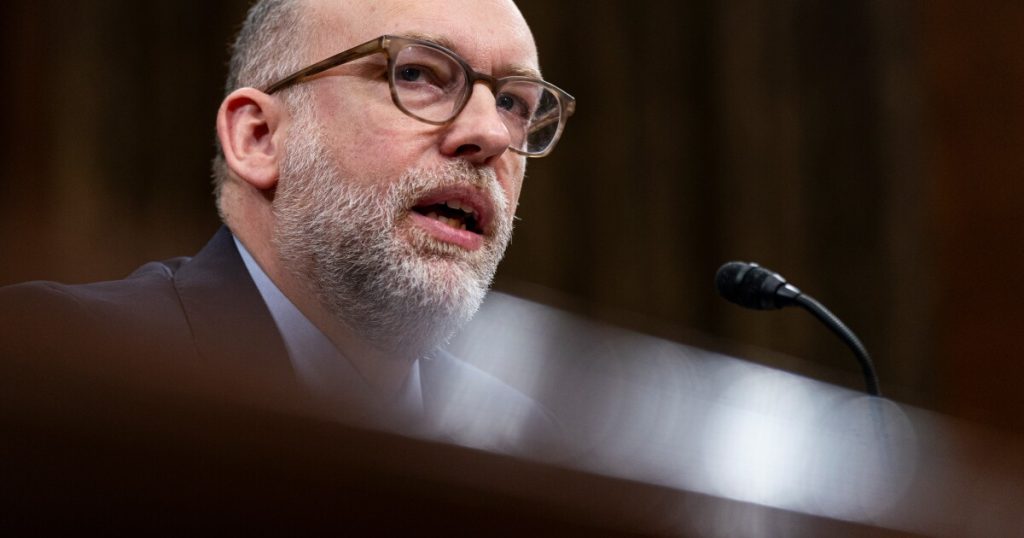- Key Insight: The CFPB has enough money to operate through Dec. 31st, but the Justice Department filed a motion about a “potential lapse in appropriations.”
- Supporting Data: The government is relying on claims by the Office of Legal Counsel that the central bank lacks “combined earnings” to fund the CFPB, as required by the Dodd-Frank Act.
- What’s at Stake: The funding dispute is part of a larger, ongoing political and legal fight against the CFPB’s unique funding structure, and efforts to shut the agency.
The Department of Justice told a court that the Consumer Financial Protection Bureau cannot legally request funding from the Federal Reserve Board because the central bank technically has no profits. The CFPB has enough money to continue operating through Dec. 31, according to the filing.
On Monday, the DOJ
In the legal filing, an assistant attorney with the Justice Department said that Acting CFPB Director Russell Vought plans to prepare a report to the President and congressional appropriations committees identifying the “funding needs of the Bureau.”
“The Bureau does not know whether and the extent to which Congress will appropriate funding to pay the expenses of the Bureau,” wrote Brett A. Shumate, an assistant attorney general in the Justice Department’s civil division.
The concept that the CFPB cannot request funding from the Federal Reserve was a novel legal theory first postulated in 2022, when the Fed first failed to report a profit.
The CFPB said that it had informed the court that the DOJ’s Office of Legal Counsel “has determined that the bureau may not legally request funds at this time from the Federal Reserve under Dodd-Frank.”
“OLC made this conclusion on the basis that the Federal Reserve System currently lacks any ‘combined earnings’ from which the Bureau may draw funding, as required by Dodd-Frank,” the CFPB said in an emailed statement.
The Office of Legal Counsel, which provides legal advice to the president, attorney general and various executive agencies, is headed by T. Elliot Gaiser, an assistant attorney general and a former solicitor general of Ohio who has clerked for Justice Samuel Alito.
The CFPB said in its statement: “OLC opinions are binding upon Executive Branch agencies, including the Bureau.”
The National Treasury Employees Union has called the CFPB’s funding issue a
Sen. Elizabeth Warren, D-Mass., the ranking member of the Senate Banking Committee, said the move was another attempt by Vought to illegally shut an agency created by Congress.
“This absurd maneuver by Russ Vought is plainly illegal, and federal judges have already rejected his fringe theory,” Warren said in a press release. “If the courts continue to uphold the law, Vought will fail again.”
She added that: “Donald Trump will do anything to try to kill an agency that has returned more than $21 billion to scammed Americans, but he will not do anything to lower costs for American families.”
The next expected move is for the full D.C. Circuit to determine whether
The CFPB is funded through the Federal Reserve System rather than congressional appropriations but Republicans already slashed the bureau’s funding this year.
Under President Trump’s
The novel theory about the CFPB not being able to get funding from the Federal Reserve gained traction in some circles in 2024, when Harvard Law School professor emeritus Hal Scott
Even after the Supreme Court’s 7-2 decision, which was written by Justice Clarence Thomas, several companies immediately filed challenges to
Vought has been in a bitter legal battle with the CFPB’s union since February. In the case, NTEU v. Vought, the union claims that the acting director planned to fire 90% of the CFPB’s employees but was stopped from doing so when the union sued. Since then, Vought has ordered the roughly 1,400 employees to stop work, and has claimed the CFPB needs only 200 employees to conduct its statutorily-required functions.
However, some CFPB employees are still working though many describe their work as designed to further the goal of closing the agency, largely by revising or repealing regulations, closing out existing investigations and exams, and defending the bureau in litigation. Under Vought, the CFPB has dismissed nearly all pending enforcement cases, with a few exceptions. The CFPB also has been closing out “matters requiring attention,” from past exams.

